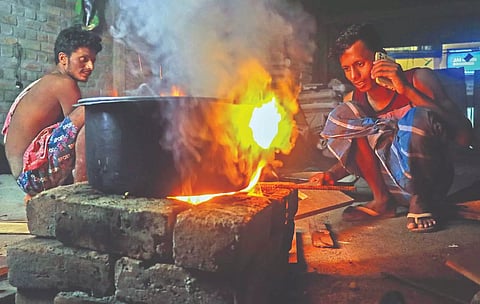

CHENNAI: A room with half-built walls is home to Allam Manirul Monin and his co-workers - all hailing from villages in West Bengal’s Murshidabad district. On the floor below lives another group of migrant workers from Bihar. This under-construction building in a densely populated locality in Central Chennai is where they cook, eat, and sleep in makeshift arrangements, share a single toilet, and have a tiny room to keep all their belongings.
The 28-year-old Mason’s day starts at dawn to offer prayers. It is his routine, while eight other workers from his native state wake up an hour later. Amid laughter and chatter, the migrant workers spend the next hour waiting for their turn to attend to nature’s calls and bathe in a makeshift bath attached to a toilet covered with a tin sheet on one side and tarpaulin on the remaining side. Two of them are busy in a tiny corner where they cook rice and curry for breakfast. Broken wooden pieces and plywood collected in the worksite are used as firewood to cook their food.
The PDS rice - purchased at Rs 6 per kg through their known suppliers to save their earnings - boils on the stove, while two of them swiftly and skillfully chop onions, tomato, and chilies to make potato curry to go with rice for breakfast. After having their food, they split into two groups. While one group of labourers work at the same site, Monin and two others leave for another work site. They pack their lunch in a plastic bucket and fill a tiffin box with the remaining potato curry for lunch. A 20-minute walk takes Monin and his two helpers to their worksite.
Starting work by 9 am, Monin and two helpers work till 9 pm. After nearly 12 hours of back-breaking work, the trio returns to the place of their stay that is lit by a single tube light. Meanwhile, their co-workers are glued to their phones, playing video games or watching songs on YouTube, or making calls to their family members back home by sitting along the incomplete balcony where they have a junction box to charge their mobile phones. Another group sticks to their routine to prepare dinner for everyone. By 9.30 p.m., they sit together for dinner. But these workers are paid at least Rs 200 less than local labourers and made to work extra hours.
After food, they sit in small groups and chat. Monin and two others seriously discuss the grocery stock to keep their monthly expenditure within the limit of Rs 12,000 (Rs 1000 to Rs 1,200 per person). After a while, they move to the second and third floors to pick their spot to sleep.
For some, cement bags have turned into their beds, while a few use plywood and bed sheets to sleep amidst piled-up bricks, sand, and other construction materials to wake up to another day of hard labour.
For them, the under-construction building is their second home until the construction is completed. While it is free accommodation, they are waiting with hope for the promised table fan from their employer.
For these workers, Marina Beach is the only place to go once in a while to relax. They go to their native place in mid-June and return after a three to four weeks stay with their family members.